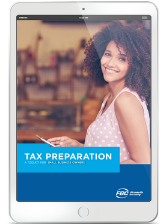Contents
Last updated: Dec. 22, 2023
Does the thought of organizing your receipts fill you with dread?
It can seem overwhelming to keep track of your receipts and record keeping on top of the demands of running your own business.
It may not be at the top of your list, but if you’re self-employed or a small business owner you are required by law to keep a record of your business transactions. If you keep good records, you will avoid Canada Revenue Agency (CRA) fines in the event of an audit.
Plus, staying organized throughout the year will help you save time when it comes to filing your taxes.
We’re all about supporting small business owners, so we’ve outlined seven tips and tricks to help you keep on top of those records.
Use a business account and credit card
It’s easy to lose track of cash transactions so it's good practice to use a credit card or debit card to cross-check details with your paper receipts. It’s a good idea to have a separate business account and credit card so you don’t mix business expenses with those incurred for personal purposes.
As a bonus, if all transactions are business related, you can claim any fees associated with that card or account. For example, the annual fee on a points card, or the interest from a balance carried from one month to the next, can be claimed if the transactions are business related.
Save your receipts
The CRA won’t accept your bank or credit card statements to justify deductible expenses – you need an itemized receipt that corresponds with the transaction. The CRA calls these itemized receipts “source documents.” Hang on to those receipts for at least six years after your last Notice of Assessment, which is as far back as the CRA will ask to see them in the event of an audit. You can keep the physical receipts or digital copies.
Featured Resource: Tax Preparation Toolkit for Small Business Owners
Spend time reviewing your receipts once a month
We always recommend to our Members that they sit down for 30 minutes every month to review and categorize their receipts. This keeps things manageable as the year progresses and keeps you on top of your spending, so you don’t miss out on any tax deductions.
Purchase an accordion folder every year to house all business receipts. These inexpensive folders are easy to obtain and allow you to organize your receipts by category and year, so finding a specific receipt is a snap in the future.
Make notes on the back of receipts
While COVID-19 is keeping a lot of us indoors, you might have meal and entertainment receipts from before the pandemic. And you could be in a position to meet with clients just a few months from now.
For these expenses, write who you met with and the purpose of the meeting on the back of the receipt right after the meeting so you’re not struggling to remember details later.
Reminder: You can deduct 50 percent of your total meal and entertainment expenses for business purposes.
Create a spreadsheet for work-from-home expenses
Maybe you’ve always worked from home, or you’ve found yourself working remotely due to the COVID-19 pandemic. Either way, if you’re self-employed and work from home, some of the deductible expenses include a portion of cleaning materials, utilities and home insurance, along with part of your property taxes, mortgage interest and capital cost allowance.
To be able to claim these expenses, the workspace in your home must be the principal place of business.
You must also calculate the percentage of your home used for business and apply that percentage to the tax deduction. Create a spreadsheet to add up your receipts for home office expenses throughout the year. Make it a habit to update the spreadsheet once a month. You’ll save yourself the headache of scrambling to input and tally up all your work-from-home expenses at the end of the tax year.
Back up your receipts
Since paper receipts tend to fade with time, we recommend you keep a digital copy of each receipt. A good practice is to snap a picture of each receipt on your phone which you can upload to a central location later.
Go digital
There are plenty of free software platforms and mobile apps that offer easy solutions to digitize your receipts. Evernote is a popular one - you can scan the receipt by taking a picture with your phone, digitize the receipt on the spot and keep the hard copy in the accordion folder.
Free Guide: Tax Preparation Toolkit
Our Tax Preparation Toolkit for Small Business owners is an easy-to-understand toolkit to help you get organized for tax season and learn what information and key documents you need to prepare so you’re ready. We've also included a printable checklist of all the documents you’ll need as a business owner, tax write offs you shouldn’t miss out on and what impact the COVID government support programs may have on your return. Our toolkit will help you get the prep out of the way so you can get back to running your business.
Download your free tax preparation toolkit here.
Contact FBC
For more than 65 years, we have worked with tens of thousands of farm and small business owners across Canada. We optimize their tax returns, maximize their tax savings and support their back office needs with bookkeeping, payroll, minute book filing and annual returns.
To find out more about how we can support your business, take 15 minutes to connect with us so we can get to know each other. Request a consultation here

